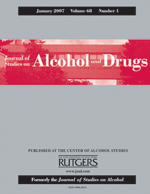The first aim of this study was to gain more insight into the bi-directionality between alcohol-specific parental factors (i.e., parents' alcohol use, alcohol availability at home, parental rule setting, and frequency and quality of communication about alcohol) and adolescents' alcohol intake and alcohol-related problems. The second aim was to examine the relative impact of alcohol-specific parental factors on adolescents' alcohol intake and related problems by studying them in a comprehensive model.
A two-wave longitudinal study, with a 2-year interval, was conducted among a sample of 537 adolescents (56% girls) ages 12–15 years in The Netherlands. Under supervision of well-instructed teachers, students filled out questionnaires in a classroom setting.
The findings show that perceived alcohol availability at home was the only parenting factor predicting an increase in alcohol intake and alcohol-related problems among adolescents 2 years later. Cross-sectional findings, furthermore, suggest that the effect of alcohol availability on adolescents' alcohol-related problems disappears when adolescents perceive strict alcohol rules. In addition, results indicate that parents respond to their youngsters' experienced alcohol-related problems by engaging in more rigorous alcohol-specific parenting (e.g., by increasing alcohol-specific rules and decreasing alcohol availability at home).
The findings emphasize that parent interventions aiming at the prevention of adolescents' alcohol use should include the advice to restrict the perceived presence of alcohol beverages at home. Moreover, to prevent alcohol problems, parents should be advised to enforce strict rules about drinking, particularly when a total absence of alcohol at home is not feasible.
Read Full Article (PDF)
